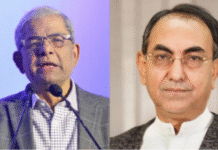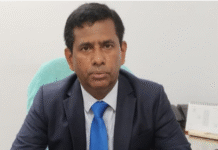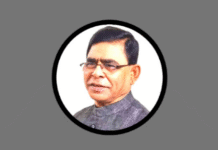 Debates are critically important for bringing improvement in a democracy, says Nobel laureate Amartya Sen terming democratic mode of governance not a perfect one.
Debates are critically important for bringing improvement in a democracy, says Nobel laureate Amartya Sen terming democratic mode of governance not a perfect one.
In a lecture in Dhaka on Monday, the world-famous economist noted that nothing can be changed in a society unless an issue is brought to the public attention through the media.
“There is no reason to assume that democracy is perfect. But improvement under the current circumstances is possible if we constantly try to correct the imperfect system,” he said.
Dr Amartya Sen also underlined the need for a vibrant media for raising critical issues of the society and offering debates and discussion to bring changes in search of just and fair distribution of economic prosperity.
He was addressing an enlightened gathering of over 2,000 people during the launching of the book “Bharat: Unnyan O Banchona”, the Bangla version of the book “An Uncertain Glory: India and its Contradictions” co-authored by Dr Sen and Jean Dreze.
Prothom Alo and Center for Policy Dialogue organised the function at the Krishibid Institute. Prothom Alo editor Matiur Rahman and CPD executive director Mustafizur Rahman moderated the session chaired by CPD chairman Prof. Rehman Sobhan. Noted singer Rezwana Chowdhury Bonnya also rendered three songs of Rabindranath Tagore on the occasion.
The economist pointed out that there are discrepancies in democracy in terms of distribution of resources and welfare gains and cited the example of the Indian poor in terms of their lack of access to healthcare services and proper education.
Sen, who identified himself as a leftist politically, however, differed with some of his old comrades that the so-called bourgeois democracy would not bring any good to the society.
“If we look only for perfection, without trying to make improvement on achievements attained so far, I think we will miss the opportunities of today,” he expressed his conviction.
In his lecture titled ‘Economic Development and Human Progress’, Amartya Sen said economic prosperity that creates opportunities, is meant for uman development.
“Economic development and human development are interrelated; even economic prosperity will be stagnant or falter at one stage if it is devoid of human development,” he observed.
In this context, he compared India with China saying that the Chinese can produce almost everything, as against only a few products by Indian, because of quality skills-based education and good health of Chinese workers. “Educated people with good health can always performance better than the illiterate people with poor health conditions,” he said.
The economist also lamented that almost 80 percent of the Indians are deprived of the fruits of development the country has attained since independence, particularly over the past few decades.
Dr Sen, who spoke almost two hours, also underlined the importance of the role of the government in ensuring healthcare and education for all citizens.
“There is no country in the world where universal literacy and healthcare facilities for all have been established by the market or without the direct involvement of the government,” Amartya Sen said.
Once again he appreciated Bangladesh’s social sector achievements, including in women empowerment and life expectancy, compared to that of India, which though attained higher economic growth and has a per capita income double than Bangladesh.
“There may be cultural and social factors apart from political impetus for Bangladesh’s better performance compared to India,” he added.
Asked how disparity could be reduced under the capital mode of economic growth, Dr Sen expressed his views that the social actors should keep vigilance and point out all ills and injustices. “We should protest unless the disparity comes down quickly,” he said.
The economist regretted that the issue of human trafficking is not being properly dealt with, since the issue involves the poorest segment of the society. “We the middle class people hardly talk to them,” he said adding that he appreciated the revelation of rape incidents in the media as a positive development.
Source: Prothom Alo









